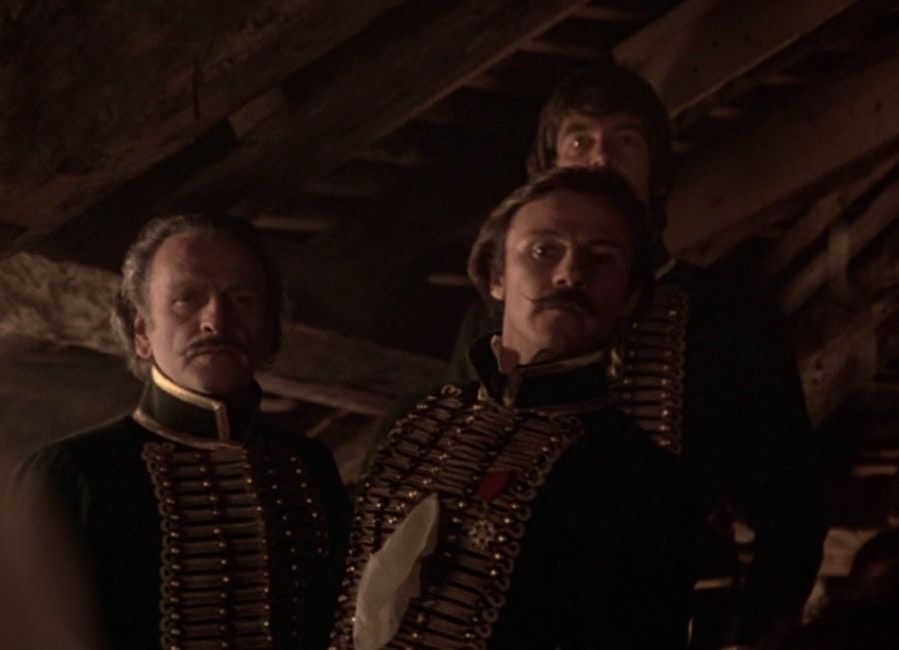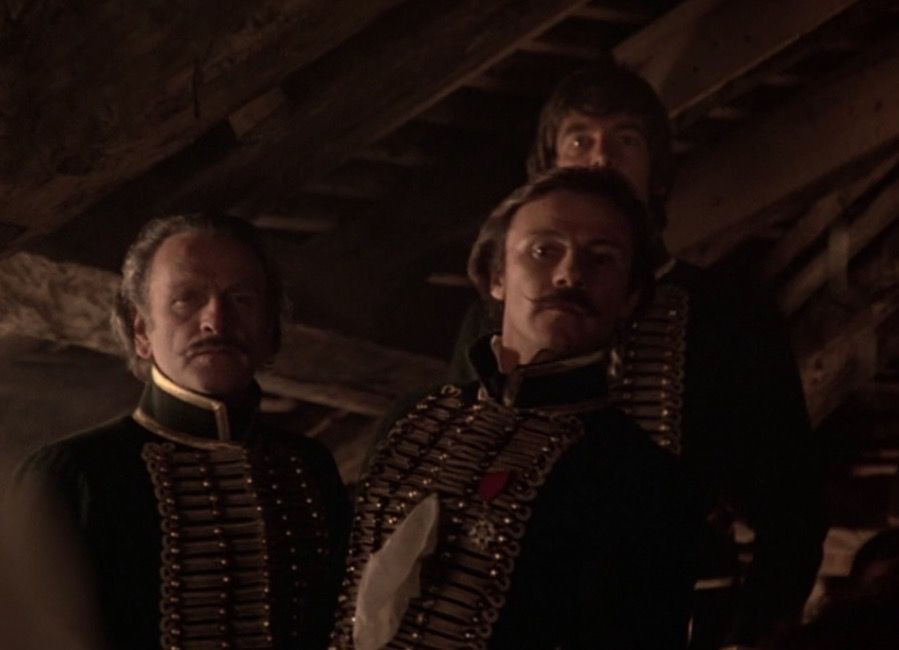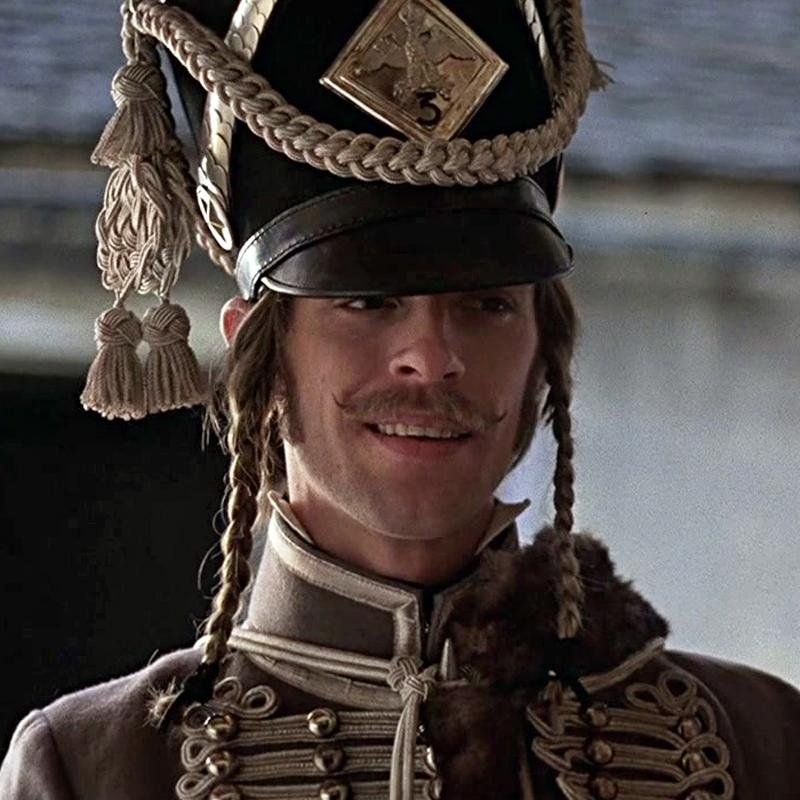Dueling (!!!) in The Duellists

It’s a badge of honor to be unable to tell if a film is great or terrible. You look good (for your subtlety), and the film looks good (for its madness). But Ridley Scott’s debut feature The Duellists is something even weirder than a great/terrible film. It’s a great/mediocre film. Nearly a week after seeing it, I still don’t know if I saw a masterpiece or an edgy adult coloring book.
What is the story of The Duellists? Well, starting in 1794 and continuing for nineteen years afterwards, François Fournier-Sarlovèze challenged Pierre-Antoine Dupont de l'Étang to a series of over 30 duels before L’Étang finally made him stop. In 1907, Joseph Conrad wrote a novella based on the story, and in 1975, Ridley Scott saw Barry Lyndon and never recovered from its incredible cinematography. A couple of years later, he began shooting a script adapted from Conrad’s story, with Kubrick’s film as his explicit influence.
In short, The Duellists’ creation is a 200-year montage of weird masculine emotions. It’s no surprise that the film is a 100-minute montage of same. Insofar as it has a hero, it’s about Keith Carradine’s character, Armand d'Hubert, an upright himbo in the army of Napoleon. Pleasant, colorless, faintly smiling, a golden Lab with a nice rear-echelon job, d’Hubert nonetheless acquires a reputation as a fire-eating man of war, because he keeps getting challenged to affaires d'honneur by this guy:

Gabriel Feraud just wants to fight duels! Duels!! DUELS!!! When Marilyn Monroe sang that “the French are glad to die for love/they delight in fighting duels,” she actually just meant Feraud, who is singlehandedly responsible for raising the average number of French duels (!!!) per capita to the highest levels in Europe. He lives to whale at other men with rapiers! Sabers! Pistols! Sometimes on horses! One day, this guy d’Hubert comes into his life, carrying an order from the general about how Feraud should stop dueling (!!!)! He now has no choice but to immediately duel (!!!) d’Hubert, who presumes to tell him what to do (and when not to duel [!!!]). More than that, he has no choice but to fight him again every time they’re in the same country! He’s going to make d’Hubert’s life a living hell until they’re generals at least!
There are some tropes that are always subverted, at least in action movies. If two men have been arch-enemies forever, you’ve got to shake it up a little bit — give them a scene that hints at friendship, or even romance, underneath the enmity. Why would they be so obsessed if they don’t love each other? Also, if you have a hero who’s boring and a villain who’s fun, of course the audience will sympathize with the villain, and the film must provide material to support this — especially if the villain possesses “honor.”
It’s impossible to like Feraud, though, who responds to d’Hubert’s one overture of friendship by walking away. He’s fun to watch, which is different from liking. Harvey Keitel’s performance evokes an endless series of animal comparisons — a cat’s head-tossing superciliousness, a horse’s barely controlled power, the empty-eyed snarl of an unpleasant dog, and as Danny Lavery pointed out to me, also a lot of meerkat energy. But the man has nothing inside of him. All of his feints of engagement with reality — his frothing Bonapartism, his gestures at women — are subsumed into his need to kick a man’s ass so hard that it implodes. His performance as an officer resembles nothing so much as Vasily Stalin’s hockey coaching in The Death of Stalin (“Come on! Play on! Play through! Ignore me! Get it! Give it! Hit it!”). He’s barely involved in the actual army, and the only thing that keeps him going is the standard violence armies provide, which is to dueling (!!!) what methadone is to heroin.
As for why Feraud and d’Hubert are obsessed with each other, I mean — they’re not. There’s no passion, no subversive friendship. Feraud sees d’Hubert as the embodiment of his current grievances. D’Hubert, for his part, isn’t wired for obsession. He is a rather sweet man who wouldn’t know how to subvert his emotions into violence, although he tries when asked. At the end of the film, he’s a tender middle-aged husband who worries about boring his young wife; earlier, we see him as an ideal, stabilizing fuckbuddy, and then in a settled relationship with Tom Conti’s charmingly dissipated doctor (I won’t take argument on the homoeroticism of these scenes; I can spot bisexuality as well as symbolic flute-playing). He pulls strings to get Feraud off an execution list at one point, but I believe he just doesn’t like it when people he knows get shot. Below, nice:

The Duellists is about projection and one-sided rivalry: Feraud looking at d’Hubert, Fournier-Sarlovèze looking at l’Étang, and probably Ridley Scott looking at Kubrick. It’s about lack of personality, done two ways. Insofar as it has anything to say, that thing is about how people construct “a badass” out of nothing — whether it’s d’Hubert’s comrades demanding ever-showier duels (at one point, he’s voluntold to fight on horseback “as a compliment to the cavalry”), or a certain kind of audience member reading a Machiavellian gambit into d’Hubert’s eventual triumph (he shames Feraud into going away by refusing to kill him). But all attempts to mythologize either man into a stone-cold killer are thwarted. D’Hubert’s not a killer, and Feraud’s not stone cold.
The funny thing about The Duellists, a film which exists to prove that someone out there has experienced the anxiety of influence, is that now I see its influence everywhere. Its singularly styled performances — flat American delivery of grand European sentiments — remind me of The Grand Budapest Hotel, which coincidentally also features Keitel. I also feel like the creators of The Princess Bride saw it, and learned from its action scenes and arch mood. Neither of these films seems particularly upset about The Duellists, which is far more of a Feraud than a d’Hubert.